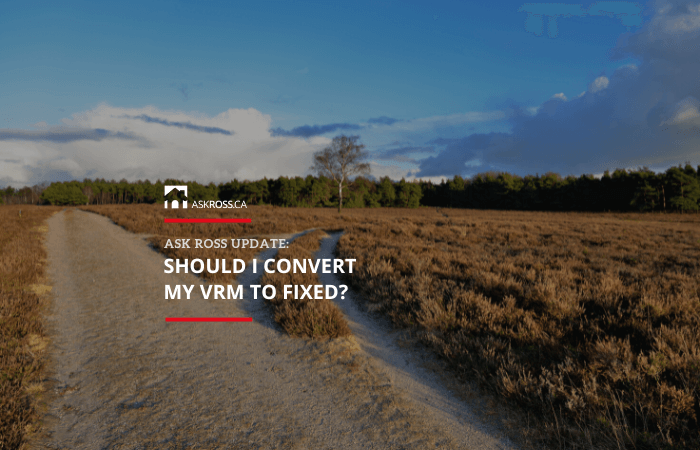
Published: August 7th, 2022 • Last Updated: July 12th, 2023
Author: Ross Taylor on AskRoss.ca
Should you convert to a fixed rate loan?
Update on July 12, 2023
Homeowners near our Richmond Hill, Mississauga, Toronto locations with variable interest rate mortgages watched in dismay as the Bank of Canada increased its overnight rate for the tenth time since March, 2022.
To no one’s the surprise, the Bank of Canada (BoC) has increased their overnight rate by 0.25% this morning, July 12th. It’s now sitting at 5%, and in March, 2022 it was a measly 0.25%.
The central bank held its key rate steady in two consecutive decisions this year but came off the sidelines last month with a quarter-percentage-point hike. The BoC, and every other major Central Bank, are still worried about inflation and the economy. And it may seem perverse, but they want to see unemployment figures ratchet up and clear signs we are in a recession.
The Prime rate will go up in synch today to 7.20%, a level not seen since early 2001. The Prime rate is the interest rate that banks and lenders use to determine the interest rates for many types of loans and lines of credit. These can include credit cards, HELOCs, variable-rate mortgages, car and auto loans, and much more.
Fixed rate mortgages beat to their own drum – and factor in many other variables, including the government of Canada bond yields and general market sentiments. In fact, since the increase of 0.25% to the BoC rate in June, fixed mortgage rates are up almost a full percentage point !!
Previously, the Bank of Canada (BoC) raised their overnight rate by 0.25% on June 7th, and the following week the Feds in the USA chose to stand pat…..for now. Per my colleague Rob McLister, the Federal Reserve now projects: 0.5% more USA rate hikes by year-end • a full 1% of rate cuts in 2024 • US core inflation near the 2% target in 2025.
With the Banks’ Prime Rate now at 7.2%, even the very cheapest variable rate mortgages are running at 6.2% or so, and many are somewhat higher.
Looking ahead, the Bank said it “will be considering whether the policy interest rate needs to rise further to bring supply and demand back into balance and return inflation to target.”
Banks and other financial institutions are expected to raise their prime rate in the coming days, which will increase rates for variable-rate mortgageholders.
So, what can mortgage borrowers who have hit their Trigger Rate do?

Increasing your payment is likely far easier on your cash flow than converting to a fixed-rate alternative.
Suppose you have a variable rate mortgage with a loan amount of $500,000 and a 30-year amortization. Looking at your repayment options, a $400 increase to your monthly payment should restore your mortgage where the balance is declining (the total interest and total cost is getting smaller, as opposed to larger).
Converting to a fixed interest rate mortgage will increase your monthly payment by $1,100 or so. Unless you can handle the larger payment increase, you will be stuck with your variable-rate mortgage.
A Variable Rate Mortgage is No Longer a Wise Choice
A variable rate mortgage should no longer be considered a prudent option at this time.
That ship has sailed. There is no predictability that the interest rates will go down in the short term. Why stress yourself if there is a decent alternative? The Prime Rate will be up again by year-end to 6.45%, maybe more.
When we initially published this article, it was late in the summer of 2022, and we had heard from a savvy, successful client who owns two properties with variable-rate mortgages.
In light of all the Prime Rate increases in the past several months, she wanted my recommendation as to whether or not she should convert either or both to a fixed-rate mortgage.

Here are a few facts:
The Bank of Canada will keep raising their overnight rate until they feel that they have bested inflation and that the inflation rate will start to decline. They are not alone – most other major countries worldwide are doing the same.
In the Fall of 2022, we wrote “Even though the Prime Rate hit 5.45% after the September 7, 2022, BoC increase, you can be confident the Prime Rate will rise further this year – perhaps another 1% is as reasonable a guess as any.
Will it stop? Yes eventually. Especially if the country enters a recession, as in such times, interest rates typically abate.”
Update December 07, 2022
We are seeing some clients in cash flow stress choosing to stay the course and NOT switch to fixed. Because it’s the smallest increase to their mortgage payment when they hit their Trigger Rate, not because they are sure it’s right.
Prime will be at 6.45% any day now and most variable rate mortgages are higher than their fixed rate counterparts. And yet, there is a growing sentiment back towards Variable Rate Mortgages. There is a sense, valid or not no one really knows, that rates will not increase much further, and those with a variable mortgage product are well positioned for the downturn.
Earlier this year, fixed-rate mortgages rose well before variable-rate mortgage rates.
They don’t move in the same way as a variable. Fixed-rate mortgages are based more on the Government of Canada bond yields. As a result, they were more stable during the summer of 2022, even in July when the Prime rate jumped 1%.
However, in the first few weeks of October 2022, fixed rates increased to their highest levels in fourteen years. When the Prime Rate increases again on October 26, 2022 (it assuredly will) the fixed rate offers might still be no higher than they are today.
In answering my client’s question, I wrote:
In terms of your specific mortgages, as variable rate mortgages go, you have two very good ones. One has a fixed payment approach (TD Bank), and the other has a payment which varies with every change to the bank’s Prime Rate (Scotia Bank). This type of variable mortgage, where your payment increases every time the Prime rate goes up is called an Adjustable Rate Mortgage.
Your rates today are 4.45% and 4.50%, while Prime today is 5.45%. Your payment was fixed when the rate was only 1.45%. If you switched to a fixed-rate mortgage now, the two banks might offer you around 5.44% for five years. Or even lower if your mortgage was hi-ratio and insured.
You need to phone each bank to ask what they could offer you on conversion. The advantage of switching with the same bank is avoiding a prepayment penalty.
Your Scotia mortgage payment has increased every time the Prime rate increases, but your TD Bank payment remains fixed. However, that mortgage is now in Trigger Rate territory, and things may change very soon.
If you decide to keep your mortgage variable, you might consider increasing your TD Bank mortgage payment by $300 to $500 now – to avoid hitting the Trigger Point I explained here. By no means is this required; it’s just a suggestion.
This is not to pick on this bank. In fact, four of the big six banks offer static payment variable rate mortgages.
To convert now is for peace of mind and to protect against the Prime rate going up another 2% or so (and once that is done, staying there)
This is a personal decision for everyone where multiple factors are in play, including budgetary concerns, economic outlook and mental health well-being. More and more, I am speaking to homeowners who feel quite stressed by this rapid change of events. Some say they cannot afford the higher payments and are already tapping into available credit and contemplating selling their homes.
Watching other sophisticated clients with multiple properties and a mix of fixed and variable rate mortgages, they are not converting any of their variable rate mortgages.
They are watching, though, as you are. If things got to the point where the Prime Rate seems out of control, then they may revisit that thought.
To be frank, looking at the big picture on October 18, 2022, it actually does feel the Prime Rate in 2023 will be unpredictable and perhaps spike higher than we dared imagine.
This is why the question of fixed or variable these days more often comes back to fixing the rate before things get much worse. The dream of lower interest rates might be farther away than we would like to think.

The Takeaway
Your story is different, of course. If you are preparing to purchase a home, refinance, or switch your mortgage, I would be happy to advise you whether a fixed-rate or variable-rate mortgage is best for you. And also what loan term is best and which lenders are best suited to your unique circumstances. We will be able to support you throughout the life of the loan, as we watch interest rate changes and how that can affect your repayment term. We can also take a look at your finances and determine if you require a cosigner to be considered for your new loan.
Update October 28, 2022.
In almost every case I will recommend you take a fixed-rate mortgage today as there is no longer much of a difference between fixed and variable rates. And we are certain the variable rate will continue to increase with the expected Prime Rate increases in the months ahead.
I want to ensure that as many people as possible in Richmond Hill, Markham, Mississauga, Toronto and the GTA can achieve their dream of home ownership and financial security. Contact me today!

 Apply For a Mortgage
Apply For a Mortgage